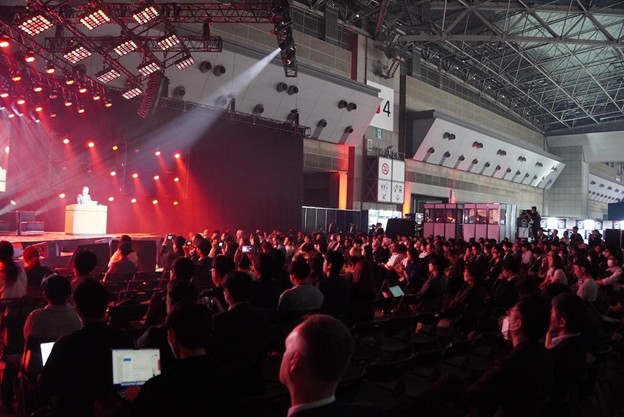
The strategic partnership between Mitsubishi UFJ Financial Group (MUFG) and Africa-born mobility fintech company Moove has become a powerful symbol of how Japanese corporations are evolving through open innovation. During a panel discussion at SusHi Tech Tokyo 2025, Hironori Kamezawa, President and Group CEO of MUFG and Ladi Delano, Co-Founder & Co-CEO of Moove, explored how authentic synergies between corporates and startups can simultaneously address pressing social challenges and drive business growth.
By combining Moove’s mission to provide financial access to the unbanked with MUFG’s global network and its role as a bridge to Japanese enterprises, the partnership illustrates a compelling new model for Japan-led open innovation with global impact.
Moove’s business model and Data-Driven Strategy
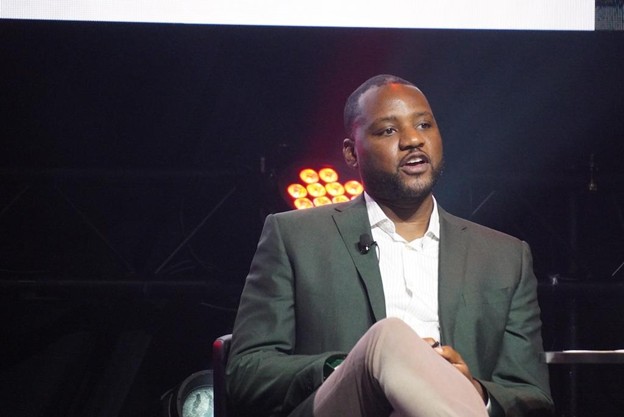
African mobility finance company, Moove, has rapidly grown by supporting the financial independence of ride-share drivers through a unique business model. According to Ladi, Co-CEO and Co-Founder of Moove, the company’s name embodies not just a brand but a social mission.
"Our flagship product is ‘drive-to-own,’ a revenue-based financing model that links vehicle ownership to driver performance. Currently, we have deployed approximately 38,000 vehicles across our markets, generating over 2.1 billion kilometers in total driven distance, " Ladi explained.
Moove’s business began in Lagos, Nigeria, where many urban residents aspired to work as ride-share drivers but faced challenges in securing financing for vehicle purchases due to lack of access to traditional banking services. To address this social issue, Moove developed an innovative credit scoring system using alternative data. By partnering with ride-hailing platforms like Uber — which provide on-demand transportation services via smartphone apps - Moove established a business model that leverages real-time operational data.
While traditional financial institutions struggled to provide loans to individuals without credit histories, Ladi’s team created a proprietary credit scoring model analyzing driver performance, including customer ratings, trip counts, and driving behavior.
"Because most of our customers lack conventional credit scores, we had to build a risk assessment method from the ground up. We use telematics, in-vehicle cameras, and GPS to monitor vehicle usage in real time, enabling visibility, control, and proactive risk management, " said Ladi.
Thanks to this technological foundation, Moove has maintained an impressively low default rate of under 3%, transforming people previously excluded from banking into reliable small business owners. Beyond financing, Moove also offers driver training, support, and performance-based incentives to comprehensively foster their success.
Moove has attracted funding from major investors including Uber, BlackRock, MUFG, and Mubadala. Notably, the company has formed multiple partnerships with Japanese automakers such as Suzuki and Toyota. Ladi credits the introduction to Mitsubishi UFJ Financial Group (MUFG) as a pivotal catalyst for these collaborations.
Looking ahead, Moove is focused on two main areas: expanding its human-driven vehicle business with a goal of deploying one million vehicles worldwide, which would create millions of jobs and promote large-scale financial inclusion and economic mobility; and growing its autonomous vehicle fleet from the current 500 to over 10,000 units by 2028.
"Our mission is to transform urban mobility by tackling critical social issues such as reducing transportation costs and expanding access to mobility for all. By combining scale with purpose, we aim to build a future where transportation is not only more efficient but also more equitable and sustainable, " Ladi concluded.
Strategic Partnership Between MUFG and Moove
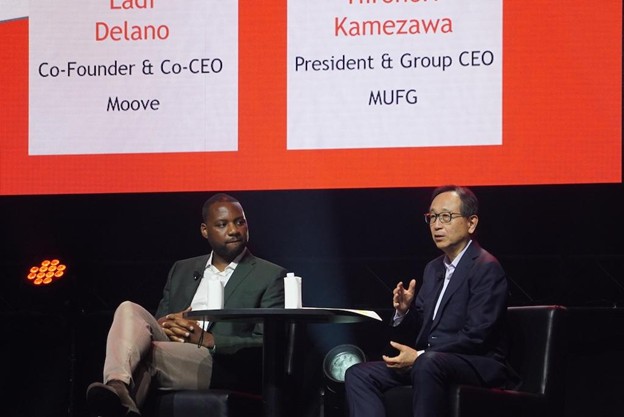
In 2022, MUFG made a pivotal investment decision: to back Moove, a fast-growing mobility fintech startup based in Africa. At first glance, the partnership may seem unexpected - but it has since become a powerful symbol of how Japanese corporations are evolving their approach to open innovation.
Kamezawa spoke candidly about the decision to invest in a region where the bank has had limited presence:
"While we do have a small footprint in Africa, it remains very limited. Yet with a population of 1.4 billion and strong economic growth, the region presents major challenges that we believe we can help address - especially in terms of financial inclusion for the unbanked and underbanked. "
At a SusHi Tech Tokyo 2025 panel discussion, Nobutake Suzuki, President & CEO of MUFG Innovation Partners (MUIP) - MUFG’s corporate venture capital arm - opened the session by underscoring that MUIP’s role goes far beyond financial returns. The fund prioritizes synergistic value creation, and in the case of Moove, that meant conducting due diligence in person.
Suzuki and MUIP’s Chief Investment Officer, Takashi “Taka” Sano, traveled to South Africa to meet Moove’s leadership and witness its operations firsthand. They came away deeply impressed by the business model, the underlying technology, and the company's firm commitment to solving real-world social issues in Africa.
A key factor in the investment decision was MUFG’s ability to act as a bridge between Moove and Japanese companies, especially automakers. The value creation from this collaboration has been substantial.
"Moove provides auto financing to drivers and has developed impressive supporting technology. We saw an opportunity to connect Moove with our automotive clients and help them build strong support networks with Japanese carmakers, " Kamezawa said.
One of the most successful results of this collaboration was the formation of a partnership between Moove and Suzuki. According to Ladi, this alliance would have been nearly impossible without MUFG’s support.
"Thanks to your help, I had the opportunity to visit Suzuki’s team in Hamamatsu, Japan. That led to one of the most successful and powerful partnerships we’ve built. As a result, we now operate exclusively with Suzuki vehicles in India, Nigeria, South Africa, and Ghana. Thousands of vehicles have been purchased from Suzuki and deployed on the road. "
Ladi also reflected on his cultural learnings through working with Japanese corporations -particularly how relationship-building takes precedence over speed or transactions, a contrast to the typical dynamics in American business culture.
"You have to invest time in building relationships. You must educate your partners about your business, your strategy, and your long-term vision. In Japan, I’ve come to understand that trust and partnership outweigh the transaction itself. "
The Future of Mobility: How AI and Technology Are Transforming the Business Landscape
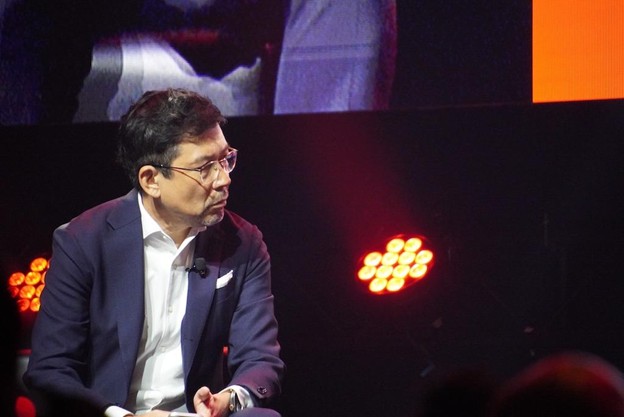
In the latter half of the session, Suzuki turned the conversation to AI, asking Ladi about Moove’s approach to integrating artificial intelligence. According to Ladi, Moove’s AI strategy began around 18 months ago and was originally sparked by its autonomous vehicle (AV) initiative.
"When you look at the AV value chain, you have companies building the technology, OEMs producing AV-compatible vehicles, and ride-hailing platforms like Uber, Grab, and Lyft. But there was a clear gap - no player was focused on owning and operating AV fleets, " Ladi explained.
To address this gap, Moove partnered with Waymo to begin operating autonomous vehicles within its own fleet. The company now owns and manages AVs as part of its core operations.
A pivotal realization came when Moove recognized autonomous vehicles as a form of "physical AI. " This shifted the company’s identity - Moove was no longer just a mobility fintech, but an operator of AI assets. That recognition prompted a comprehensive reevaluation of how AI could be leveraged across the business.
"One of the first things we had to do was shift our mindset - from simply enabling platforms with AI to becoming an AI-first platform ourselves. That led us to identify six major business domains where AI could make a transformational impact, " said Ladi.
According to him, these six domains include:
- Fleet Operations – AI is used to optimize the timing and strategy of vehicle deployment.
- Driver Management – AI-powered chatbots and agents help reduce customer service costs.
- Financial Services – AI streamlines loan processes and invoice reconciliation.
- Payments and Collections – Intelligent systems support more efficient financial operations.
- Back Office and Operations – This is a critical area where Moove is redesigning its entire organizational structure from an AI-first perspective.
- Data Collection and Utilization – A domain many companies focus on, but one that Moove sees as central to executing its broader AI vision.
"Overall, we’ve found that AI helps reduce downtime, lowers default rates, and improves productivity across the board, " Ladi added.
Through this holistic AI strategy, Moove is fundamentally transforming its business model. At the core of its aggressive autonomous vehicle growth lies a clear vision: to address urban mobility challenges in a more efficient, inclusive, and sustainable way.
Pioneering Japan's Future through Practical Open Innovation
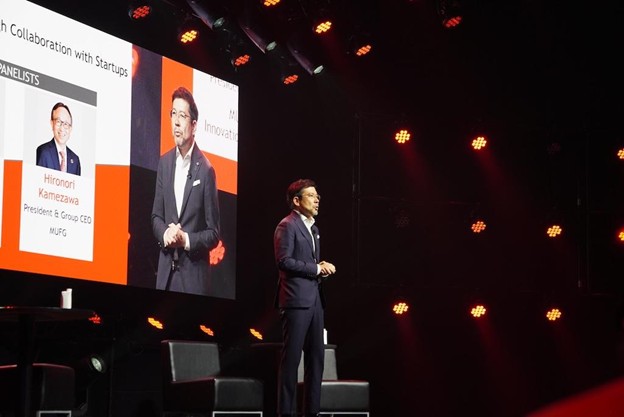
To close the panel discussion, moderator Suzuki asked both panelists to share practical advice for fostering successful collaboration between startups and large corporations - a topic offering valuable insights for Japanese companies pursuing open innovation.
From the corporate side, Hironori Kamezawa, President & CEO of MUFG, highlighted two critical elements, "mindset and speed. "
"Over the past five years, we’ve undergone a cultural transformation and fundamentally changed our mindset. As a result, collaborating with startups has accelerated this evolution among our employees. We must become an attractive partner of choice for startups, and to do so, we must be able to match their speed,” Kamezawa explained.
The partnership between Moove and MUFG served as a case in point. Kamezawa admitted he had initially expected Moove’s growth to take more time. However, the startup progressed far faster than anticipated, delivering tangible results within just six months. This experience underscored the necessity for large corporations to adapt to the startup pace.
"MUFG is the largest financial institution in Japan and has a strong global network across Asia, the Americas, and Europe. But supporting Moove’s customers—drivers in Africa and Latin America—or solving complex business challenges in emerging markets alone is extremely difficult. By combining MUFG’s financial expertise, capital strength, and network with the innovation and technology of startups, we can deliver new forms of value that neither of us could achieve on our own. Together with startups, we aim to fulfill MUFG’s purpose: " Committed to empowering a brighter future. " Kamezawa explained.
From the startup perspective, Ladi shared three key lessons he had learned through working with Japanese corporations.
First, partnerships with Japanese companies may take time to establish, but they can lead to significant long-term revenue. Second, focusing on strategic value creation beyond just capital or financial investment leads to stronger business outcomes. Third, when startups evaluate investors, they increasingly prioritize value-add over capital alone—an area where Japanese firms often excel.
"These lessons have fundamentally transformed our business and accelerated our global expansion, " Ladi said.
This new model of open innovation - where Japanese corporates and global startups combine their strengths to drive growth and tackle social issues - is becoming a powerful force for change. The MUFG-Moove partnership exemplifies how such collaborations can break traditional boundaries, deliver meaningful innovation, and address pressing global challenges, from expanding financial access to the unbanked to building a more sustainable future for mobility.
